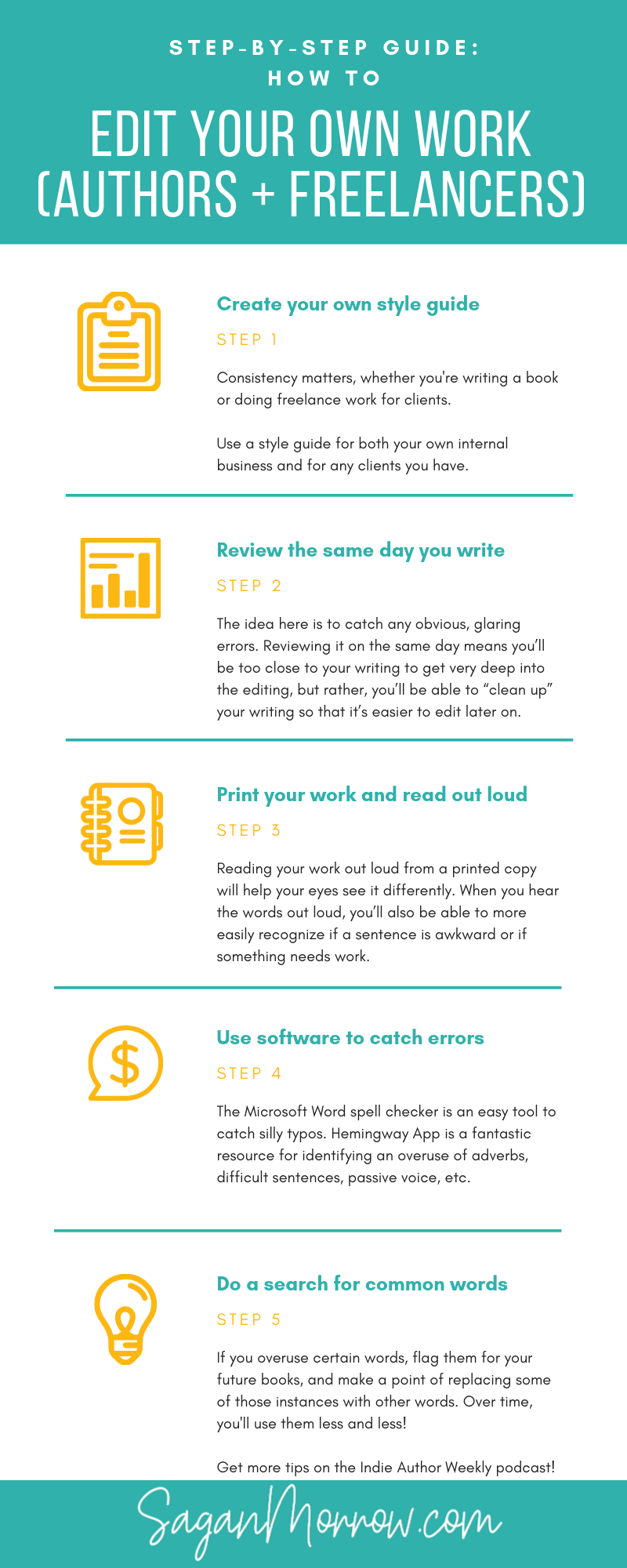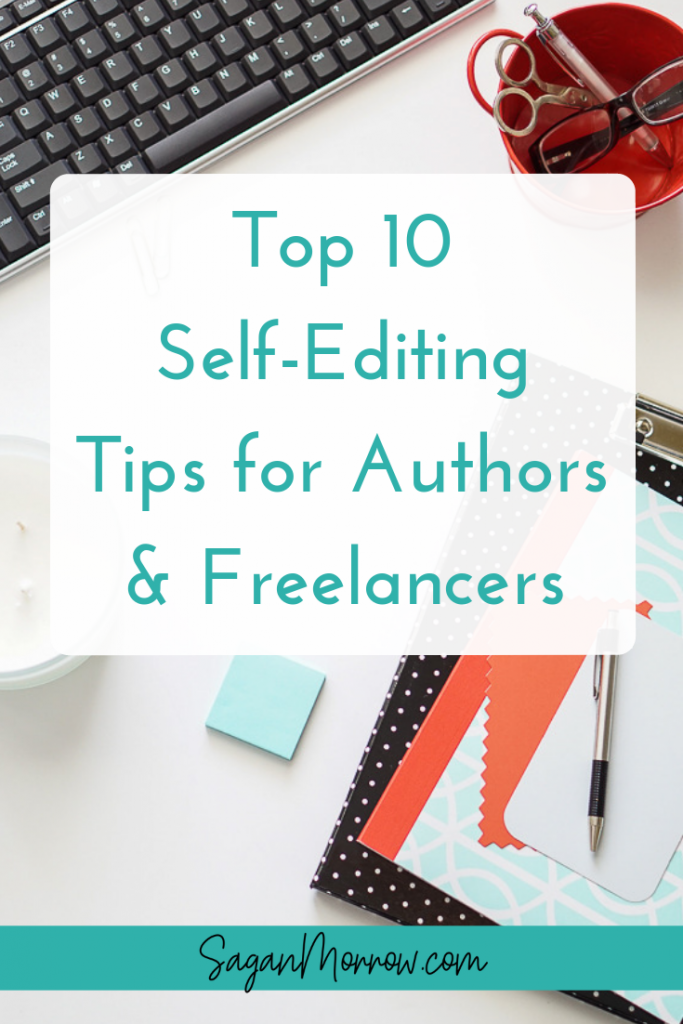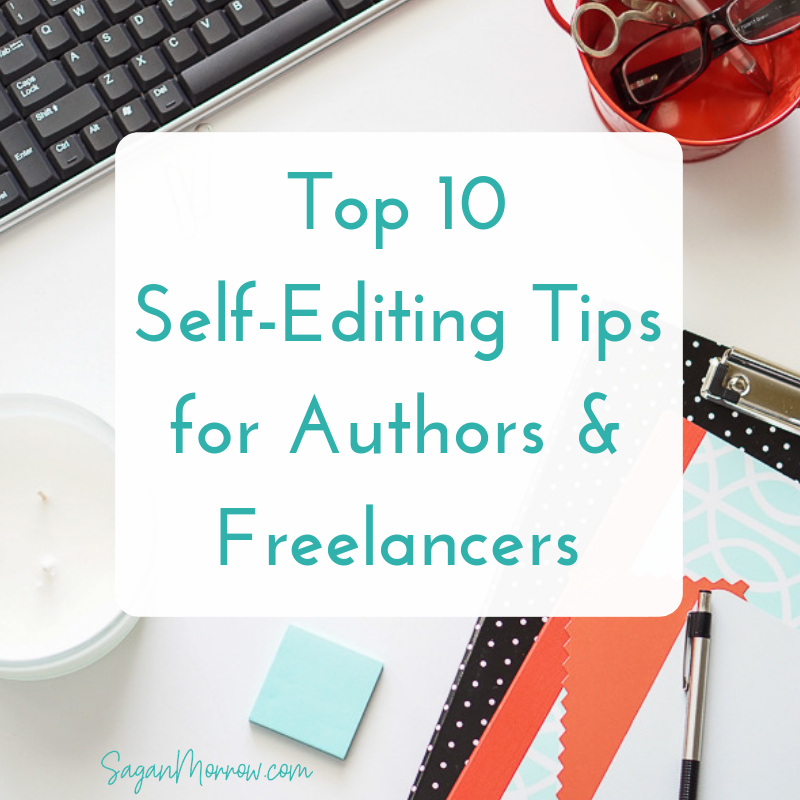Last week, I published an episode on the Indie Author Weekly podcast, sharing 10 self-editing tips for editing your own work when you're a book author.
The good news? These tips can apply to your business, regardless of whether you're a freelancer or author! Every type of solopreneur can benefit from editing their work. You can use these tips for your own internal business projects (e.g. social media posts, blog posts, newsletters, website copy, etc.), for any type of client work you do, or, of course, for self-editing your own books, if you are an author.
Want to listen instead of read? Tune into the original podcast episode:
10 tips for editing your own work...
Self-editing tip #1: Choose which dictionary and type of English you’re going to write in.
Are you writing in American English or UK English, for example? Are you choosing to use the Canadian Oxford English Dictionary or Merriam-Webster? Choose one and stick with it.
How this applies to freelancers: Choose one dictionary for your own internal business! Every time you do work for clients, ask them if they have a preference. Keep in mind that just because your client is based in Canada, for example, doesn't necessarily mean they use Canadian English. Their target audience might be based in the United States, in which case they'll be more interested in using US English. When in doubt, ask!
Self-editing tip #2: Create your own personal style guide.
Consistency matters. Whether you choose to spell the world “colour” with or without a “u,” for example, matters less than spelling it the same way every time.
This will be easier when you choose a particular dictionary to use, but oftentimes, dictionaries will offer you all the variations of spellings. That’s where creating your own personal style guide comes into play.
I use a basic Google doc with an alphabetized bullet list to indicate whether I prefer one spelling or another. And when in doubt, I like referring to the Chicago Manual of Style, so it’s helpful to have a legitimate style guide handy as well, if possible.
How this applies to freelancers: Use a style guide for both your own internal business and for any clients you have.
Self-editing tip #3: Create your character bible.
This is where you want to include basic character details, such as what colour their hair is or how old they are or what company they work for, etc.
 This will make your life a million times easier when you refer to your character bible on a regular basis as you are writing your book(s).
This will make your life a million times easier when you refer to your character bible on a regular basis as you are writing your book(s).
How this applies to freelancers: Are there any important notes you need to keep track of for your clients, in terms of that client's values etc.?
Make note of that in client "brand bibles" so that you don't accidentally post something off-brand on their social media accounts if you're their social media marketing manager, for example.
Self-editing tip #4: Remember to actually use your personal style guide and character bible.
There’s no point in creating these awesome resources for yourself if you aren’t going to actually use them! Refer to them before you start a writing project and every time you take a pause between writing another section of that book. This will keep it all fresh in your mind and ensure you have less backtracking and editing to do later on with your book.
How this applies to freelancers: Keep these documents handy and easily accessible in your home office so you don't forget about them.
Self-editing tip #5: Review your work the same day you write it.
The idea here is to catch any obvious, glaring errors. Reviewing it on the same day means you’ll be too close to your writing to get very deep into the editing, but rather, you’ll be able to “clean up” your writing so that it’s easier to edit later on.
Plus, it’ll give you a chance to be that much more familiar with your work as you continue moving forward with the story—you won’t want there to be any major inconsistencies in the plot, after all.
How this applies to freelancers: Are you creating content for your business or a client? Set aside time later on the same day to go over it.
Self-editing tip #6: Plug your work into Hemingway App to check for adverbs, passive voice, and hard-to-read sentences.
Passive voice isn’t an issue I personally have to deal with, but I am a major sucker for adverbs! Hemingway App is a great tool for highlighting adverbs so I can delete them or rework a sentence to make it stronger. I like to plug one chapter at a time into Hemingway App to make it easier to revise.
How this applies to freelancers: Are you a content creator? Always plug your work into Hemingway App (for yourself or for clients) to catch these issues.
Self-editing tip #7: Print out your work and read it out loud.
Reading your work out loud from a printed copy will help your eyes see it differently. When you hear the words out loud, you’ll also be able to more easily recognize if a sentence is awkward or if something needs work.
How this applies to freelancers: You won't necessarily need to print out everything you write for your business or for clients, but reading it out loud off the screen is a good strategy!
Self-editing tip #8: Read your work on an e-reader.
When I started doing this, I discovered that some of my paragraphs were unnecessarily long. Nowadays, I have much shorter paragraphs in my novellas, which makes my books much easier to read on e-readers. 
Reading your book the way your readers will read it will help you see any formatting errors and also catch typos in a different way than if you’re looking at it on your computer screen.
How this applies to freelancers: What is the most common device used, either for your own target audience or your client's target audience? For example, if your target audience uses mobile devices more often than a large desktop computer, then check that the formatting works great on mobile as well as on a computer screen.
Self-editing tip #9: Use the Microsoft Word spell check.
It’s not the best tool in the world, but it’s great for catching silly mistakes, like typos, that you might have missed. And I also find that the spell checker on Word is more effective than what Google Docs has.
How this applies to freelancers: Always use the spell checker for a quick double-check before submitting client work or publishing your own work.
Self-editing tip #10: Do a search for common words you use.
I tend to unnecessarily overuse the word “that,” so I often have to go through and delete a bunch of them. You might also discover, from rereading your work, that you reuse the same adjectives again and again, so do a search to see how many times you use one word compared to another.
If you overuse certain words, flag them for your future books, and also make a point of replacing some of those instances with other words.
How this applies to freelancers: Pay attention to any words you are guilty of overusing, so that you can flag them and do a quick search of them for all content you create. Over time, you'll use those words less and less.
Interested in learning more book editing tips and about the adventures of being an authorpreneur?
Tune into the Indie Author Weekly podcast for more tips just like these.
